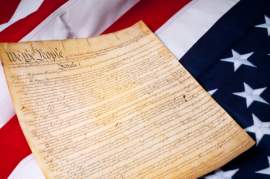
Who Is Roger Sherman

Popular In Constitution
Purpose Of Lifetime Appointment And Pros And Cons Enumerated Powers Bicameral Legislature Background Article 3 Of The Constitution We The People 1st Amendment Who Wrote The Constitution Judicial Review Equal Protection Clause 5th Amendment 10th Amendment Three Fifths Compromise
Roger Sherman was the only Founding Father to have signed what is now considered the four great state papers of the United States of America: the Continental Association, the Declaration of Independence, the Articles of Confederation, and the United States Constitution. Roger Sherman was a prominent politician who served on the Committee responsible for drafting the Declaration of Independence.
In contrast to more radical or boisterous Founding Fathers, Roger Sherman was a reserved man, focused primarily on the legal system of America. Sherman served as the Mayor of New Haven, Connecticut, and quickly grew a mountain of wealth that earned him both power and respect. His peers viewed him as an honest, educated man who perceived the Revolution as an economical and legal issue.
Roger Sherman greatly resented Parliament and
their unjust taxation methods. An active and influential member of the
Continental Congress, Sherman was one of the first Founding Fathers to deny the
supremacy of Parliament. He believed that the British government had no legal
justification to enforce laws or levy taxes on American settlers.
Although conservative, Roger Sherman quickly became a leader in Revolutionary politics. Even though the prominent politician was staunchly against British politics, Sherman still believed that a central government was necessary for the betterment of man. Sherman originally favored the Articles of Confederation. While in Congress he drafted a series of amendments which attempted to solidify the powers of the central government.
Along with
supporters, the Mayor of New Haven envisioned a government stable enough to
levy taxes, establish a Supreme Court, and create a set of legal codes that all
of society would follow. Sherman's efforts, unlike George Mason or Patrick Henry,
were not focused on the rights of the individual, but instead, on the process
of electing officials and balancing powers within the Federal Government.
When various Founding Fathers and State leaders
met at the Constitutional Convention of 1787 their objective was clear. The
Articles of Confederation represented the first true form of Constitution in
American history. Like many first drafts, the Articles of Confederation was met
with great skepticism. Sherman and the other prominent figures set out to amend
the Articles and create a document that unified, as well as successfully
established, America as a functional and progressive nation.
In response to the objective, Roger Sherman proposed what is now known as his greatest accomplishment to American History. The Great Compromise, or Tennessee Compromise, was introduced by Sherman during the Constitutional Convention and aimed to organize the inner-workings of the Federal Government. The Great Compromise was created to alleviate a long struggle regarding State representation. When the Articles were drafted, the separation of powers between large and small states were askew. In the Great Compromise Roger Sherman essentially created the bicameral legislature which resulted in the current formation of the House of Representatives and the United States Senate.
The bicameral legislation (lower House and upper House) in the Great Compromise featured a legislative structure that balanced powers between heavily-populated states and their smaller counterparts. The lower House favored the larger states and based representation on the population of the State. Candidates were to be elected by the people of the particular State in proportion to the population. Membership in the upper House, however, was not based on population and instead allocated two seats to each State regardless of size. Upper House (presently the Senate) officials were elected by State legislatures until ratification of the 17th Amendment awarded that right to the people. The Great Compromise lead the way for the creation of the United States Senate and House of Representatives and successfully balanced the powers between large and small states.
NEXT: Samuel Adams




















